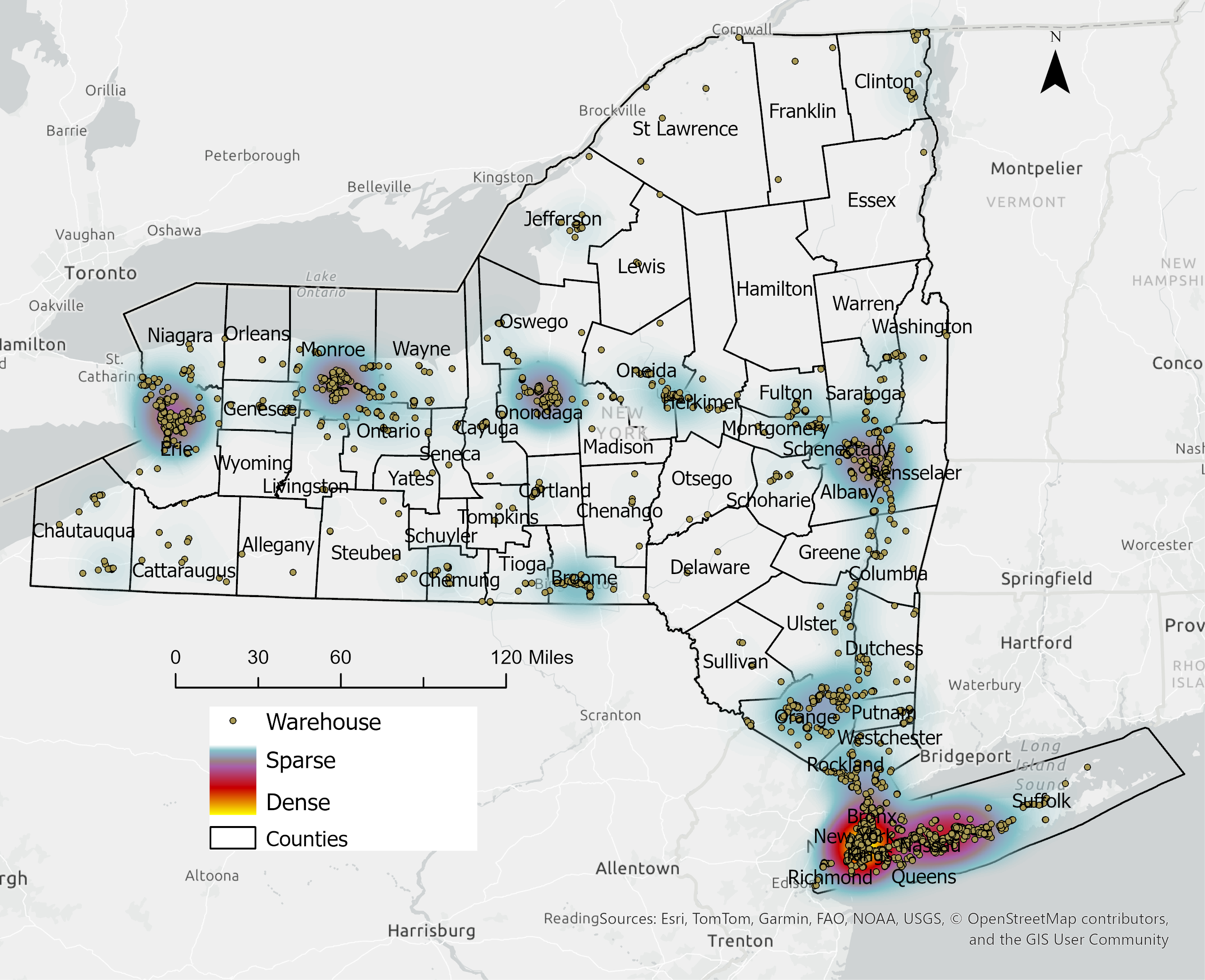New Report Finds Disadvantaged Communities Bear the Brunt of Massive Warehouse Expansion Through New York State
Communities exposed to warehouse-associated diesel truck pollution face higher levels of air-pollution-linked health problems like asthma and cardiovascular disease
Contacts
Joe Liesman, jliesman@edf.org
Nydia Gutiérrez, ngutierrez@earthjustice.org
Today, the Environmental Defense Fund (EDF), in collaboration with the ElectrifyNY coalition, updated their 2024 Warehouse Boom report with new data and analyses on the impact of warehouse expansion across New York State and the demographics of the communities living closest to warehouses.
The 2025 Warehouse Boom report found that:
- State-defined disadvantaged communities cover 8.1% of the state but contain 50% of warehouses.
- Four times more warehouse square footage was built over the last decade, compared to the prior decade.
- As a result of the warehouse boom, nearly five times more warehouse-generated diesel truck trips are estimated to have occurred over the last decade, compared to the prior decade.
- Annually, an estimated 13,500 new pediatric asthma cases are attributable to NO2 pollution — a main pollutant released by diesel trucks.
“From Albany to The Bronx, people are suffering from an explosion in pollution from diesel truck trips associated with the recent warehouse boom,” said Sam Becker, Project Manager at Environmental Defense Fund. “Our new report details the impacts of the warehouse boom and makes clear that the path to healthier communities starts with clean deliveries.”
The 2024 report traced the growth of warehouses — and their associated truck pollution — in New York communities and found one in four New York residents were living within a half mile of a warehouse, a disproportionate number of whom were people of color and low-income. The 2025 report includes updated information about the demographics of people living next to warehouses, now available at the state, regional and legislative district levels.
Analysis supports legislative actions
This report comes as the Clean Deliveries Act (S.1180A/A.3575), a bill that would require warehouse operators to choose from an array of actions to reduce pollution, is back on the table. Without legislation, pollution associated with warehouses will continue to disproportionately harm Black, Hispanic/Latino, low-income, and limited English communities and could undermine the achievement of the state’s climate goals and ability to ensure a safe, healthy, and fair future for all. Other key provisions of the bill include enhanced requirements for warehouses operating around sensitive sites like schools and hospitals and ongoing reporting requirements.
“The new data and analyses in this report further emphasizes the need for legislation to protect the state’s most vulnerable communities from the growing pollution problem surrounding mega warehouses throughout the state,” said Liz Moran, Policy Advocate with Earthjustice and member of the ElectrifyNY coalition. “The Clean Deliveries Act is common sense policy that recognizes the reality that communities of color are disproportionately impacted by health-harming diesel truck pollution and provides science-backed solutions to create a healthier and fairer future for all. We urge the Legislature to swiftly pass this bill.”
“For too long, low-income communities and communities of color — like those I represent in Brooklyn — have been treated as sacrifice zones for warehouse development and diesel truck pollution,” said Assemblymember Marcela Mitaynes, (Assembly District 51). “The findings in this report are a clear call to action. We must pass the Clean Deliveries Act to ensure our communities are protected from toxic air pollution and are given the clean, healthy environment we all deserve.”
“I co-sponsored the Clean Deliveries Act because we must continue to protect the air we breathe from fossil fuel pollutants,” said Senator Pete Harckham, (Senate District 40). “The super-sized warehouses now being constructed seemingly everywhere generate more truck and vehicular traffic — and produce more air pollution — while undermining many of our advances in establishing environmental justice in our underserved communities. Passing this legislation means standing up for the health of our neighbors.”
“This year’s report reinforces how communities of color in New York are disproportionately impacted by the rapid increase in pollution related to the warehouse boom. The finding that half of all warehouses in our state are in disadvantaged communities is alarming and a call to action to pass the Clean Deliveries Act — which would help reduce pollution and create a healthier future for all New Yorkers,” said Senator Julia Salazar (Senate District 18).

Additional Resources
About Earthjustice
Earthjustice is the premier nonprofit environmental law organization. We wield the power of law and the strength of partnership to protect people's health, to preserve magnificent places and wildlife, to advance clean energy, and to combat climate change. We are here because the earth needs a good lawyer.